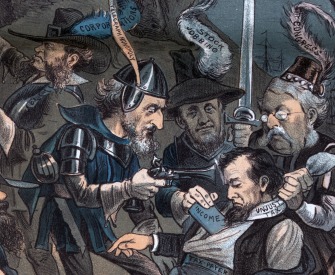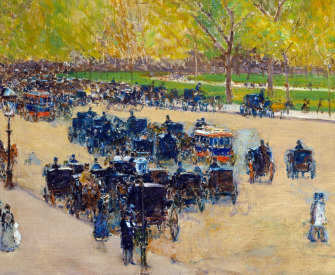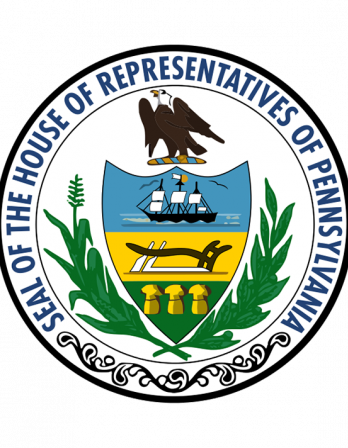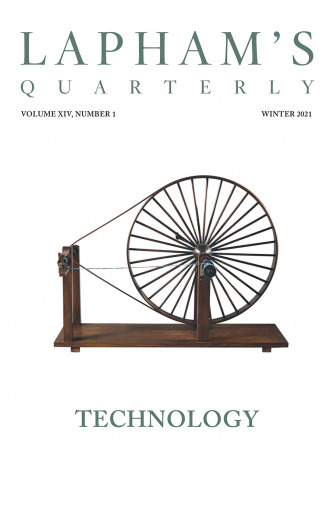Moderation in all things.
—Terence, 166 BCPicking Up the Tab
Anne Roiphe helps a friend survive the night.
The streetlights were dim in the dark below. An occasional car passed by. Far beneath the sidewalk the trains to Harlem and on to Westchester rumbled past in the blackness of their tunnel unheard, unheeded. The traffic lights changed from green to red and back again, and the moon unseen passed overhead. I slept.
Then the phone rings. It is loud and I wake, suddenly. I answer. “Doc,” the voice says. “It’s Doc.” Doc Humes, Harold Humes, best-selling novelist, designer of prefabricated houses, founder with George Plimpton and Peter Matthiessen of The Paris Review, that Doc Humes was calling me at this unforgiving hour. “Yes,” I say. My heart jumps. “What?” I ask. “My head was pushed into the mirror,” he says. “I cut my face and there was blood all over my face.” I am wide awake. “Are you bleeding now?” I ask. “That,” he said, “is the terrible thing.” “What?’’ I say. “When I looked in the mirror again I was not bleeding at all. I could see no cuts.” “Then you’re all right,” I say. “It’s the voice,” he said. “What do you mean?” I ask. “The voice said to me, ‘Work or I will kill you.’ Then something pushed me into the mirror, and when I pulled back I saw the cuts and the blood running down my face, the cuts that are gone now.” “God,” I say. “The voice says I have to write, but I can’t. I will be dead by morning,” he says. I say, “I’m coming, I’m coming down, give me the exact address.” He does. He is staying in a cold-water flat on the still-unfashionable Lower East Side where my grandparents first lived when they landed on these shores. I hang up. I dress quickly, my bell-bottomed jeans, my blue sweater with the holes in the elbow, and then I go to wake my child. She doesn’t want to rise. I pull a sweater over her pajamas. I lift her in my arms. She wraps her small legs around my waist. My love for her is greater than all the seas that heave across the planet. Her head is buried in my shoulder. I take my purse. I go downstairs.
There are few taxis running along the avenue at this hour. I wave at the empty street with my free hand. Why did Doc call me? Why didn’t he call his wife, the mother of his three young daughters? He had left his wife for the moment. He had perhaps forgotten her. He trusted me because I took him into my bed, whatever strange hour he came to the door. His bulky frame, his slightly protruding stomach, his wild eyes, pleasing me even when I knew the man was a snake charmer and I was a snake.
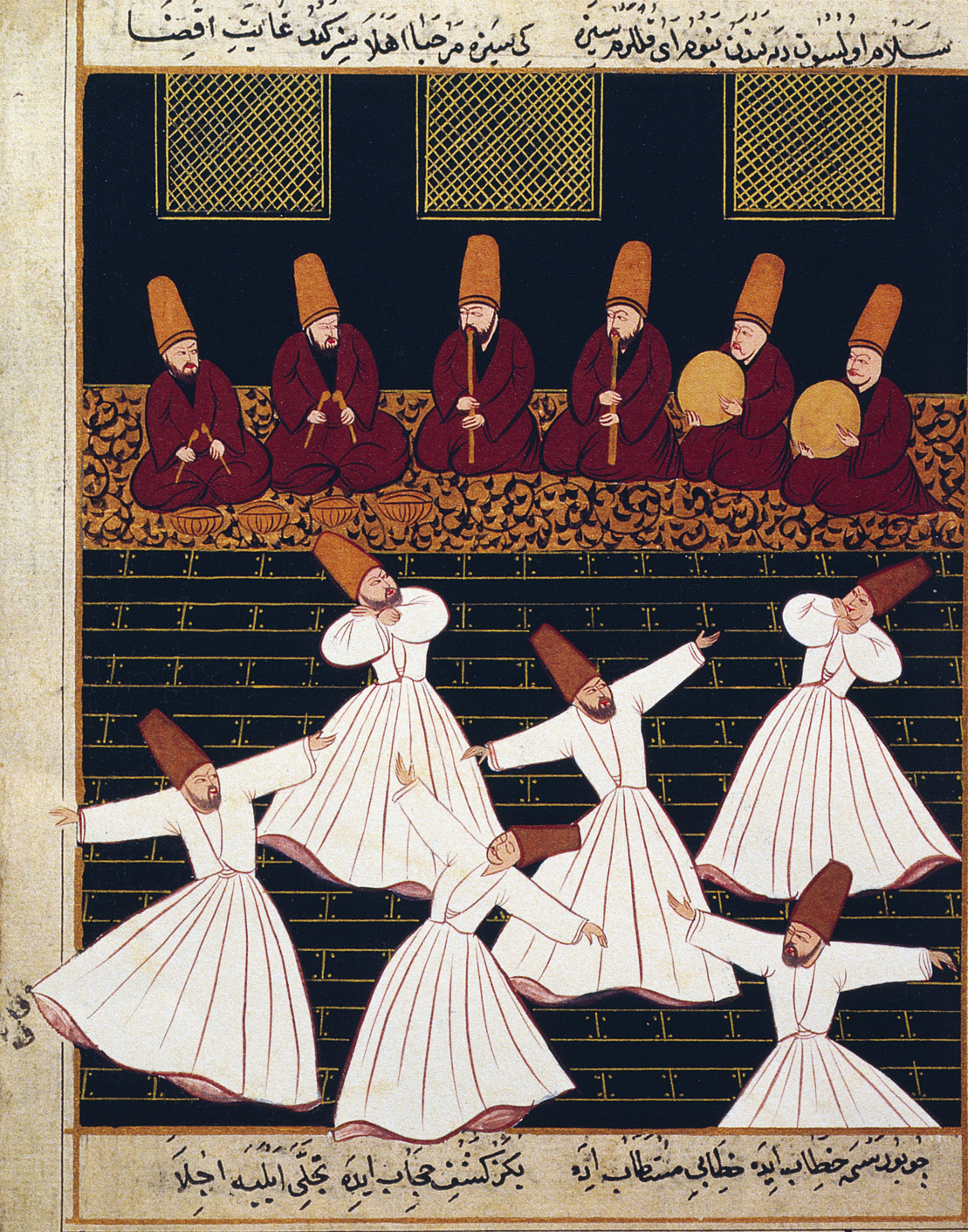
Ritual of the whirling dervishes at Konya, seventeenth century. © The Bridgeman Art Library.
Artists were drinkers. Everyone knew that. Alcohol flooded through their veins the way the salt from the sea coated the lungs of fishermen out in a storm. Alcohol was the lubricant of genius, the secret ingredient that fertilized the words in the brain, words that would bring fame and fortune to those who could catch them and release them on the white page rolled into the typewriter. Artists had a way of losing their way as easily as the rest of us lost our keys or misplaced our pens. I believed in the drunkenness of artists the way I believed in the elephants’ fondness for peanuts or the lust of cats for mice, the joy of earth for worms. The men needed to drink, needed to lift the heavy shadows that followed them about. They needed to chase away their fears of insignificance, their fears of being passed over, their old fears of the dark and what waited there: ignominy and the shame of failure. There were the old drunks like Hemingway and Fitzgerald and O’Hara and Ford Madox Ford, and then there were Nora and Nick Charles of Thin Man fame who sipped martinis day and night while solving murders. “Liquor is quicker,” as Dorothy Parker said. Editors and writers went out to three-martini lunches and fell asleep at their desks in the late afternoon. Bars and clubs, ladies’ luncheon spots all served drinks with olives and cherries and colored pink or green. But nevertheless in the afternoon the women sometimes threw up in the ladies’ room and tipped the maid to clean away the evidence.
I believed that there would be no blue sky without the sun and there would be no books without Scotch, no poems without rye. Alcohol was not a medical problem. It was the romantic grease of a dark story: the vampire love of my youth.
I believed that the most certain way to die was to live a normal life, a gray-flannel-suited life, a lonely crowded life, a life of commuter trains and country-club luncheons. I believed that I was going to be a muse to a man of great talent and visit the bordellos of Morocco and sleep under the stars with the peasants of Franco’s Spain. I was going to carry Hemingway’s manuscript on trains that stopped in mountain towns with gypsies singing on the platform. I was going to caress the forehead of the bedeviled and misunderstood F. Scott, while Zelda danced on tabletops when happiness had left her and madness had moved in. I believed that art, for me the art of the story, the written word, was worth dying for. I would have thrown myself under the wheels of an oncoming car if, as it moved forward, an undiscovered manuscript of Camus’ had fluttered down to the ground. And I knew that night after night I would see empty glass after empty glass sit on the table as the men in the room called for refills, another, the one after that. I would watch them grow unsteady and make wild accusations and push each other. I would watch as the amber liquids pooled in the cells of the liver, turned the capillaries of the eyes red with eagerness, and made even very young hands shake as they waved in exaggerated gestures through smoke-filled rooms.
I carried with me into the West End Bar, the White Horse Tavern, a long list of things I would never do: I would never have my hair set in a beauty parlor. I would never move to a suburb and bake cakes or make casseroles. I would never go to a country-club dance, although I did like the paper lanterns casting rainbow colors on the terrace. I would never invest in the stock market. I would never play canasta. I would never wear pearls. I would love like a nursling but I would never go near a man who had a portfolio or a set of golf clubs or a business or even a business suit. I would only love a wild thing. I didn’t care if wild things tended to break hearts. I didn’t care if they substituted Scotch for breakfast cereal. I understood that wild things wrote suicide notes to the gods and were apt to show up three hours later than promised. I understood that art was long and life was short. This made artists Olympian and wives and girlfriends of artists had a great task: to pay bills, to supply meals, to keep fear of poverty at bay so creation could continue. Was this naked neurosis? Was it masochism in fancy dress? Was it innocence or corruption? Was it sweet or nasty or just plain stupid? I would take years to figure it out.
I wasn’t a drinker myself. First of all, it all tasted terrible, even drowned in ginger ale, or diluted in soda, or swallowed quickly in a little glass. Second, it made me fall asleep and lose the thread of the conversation. I knew that women with their mascara running, with their lipstick smeared on their teeth, with their legs askew, with runs in their hose, tears and loud voices, were undesirable, and to be undesirable was to make a fatal mistake. Also, long before the phrase became commonplace I had appointed myself the “designated driver.” This was my trap but also my salvation.
I always had a soft spot in my heart for gangsters’ dolls, gunmen’s molls. Cute ladies with low-cut silk dresses who always got a raw deal no matter how well they passed the canapés around, or lit a fellow’s cigar, or sat on a lap and stroked a bald head. I knew they had their thrills even if their cut of the action was small.
A taxi comes. I place my sleeping child on the seat. I climb in next to her. It is an expensive ride from Park Avenue to Avenue A, but at this hour there are no other cars on the street and we move quickly. My heart pounds. We arrive. I pull my child out of the cab. She wakes and asks me where we are. I stroke her hair. She puts her head down on my shoulder and falls back asleep. I buzz the apartment. The door opens. I walk up the four flights of urine-stained stairs. There is Doc waiting for me on the landing. He looks like a man who has been ruined, maimed. He stoops slightly. His face is unshaven but I see no trace of a cut. I see no blood on the linoleum floor of the apartment. His typewriter is on a small table in the kitchen that also holds a bathtub. There is a mirror on the wall above the table. “I was sitting here,” and he shows me the worn armchair in the corner. On the floor nearby sit empty bottles of beer: many empty bottles of beer. “I couldn’t work. I wasn’t working,” he says to me. His eyes hold mine. He is looking at me. There is a tenderness in his look. He sees me. I think he really sees me. He gently takes my child and places her on his bed and covers her with his blanket. As he sets her down I hear more bottles rattling on the floor under the bed. There is the smell of pot in the air. The iron bars at the window that keep robbers from entering cast shadows across the floor. The blanket he pulls over the child reeks of pot. He explains to me that he was sitting at his typewriter not writing a word when this furious, loud, roaring voice spoke. “This mirror has never been cracked,” I say. “The mirror was splintered,” he says. I don’t argue the point.
I get a towel from the bathroom and wet it and wipe his forehead with it. He had published a best-selling book and another book equally heralded some ten years before, and then there had been an interference, a static, a crumbling of his mind, as if an earthquake had dislodged the landscape, as if an ice age had frozen the gift he had been given and the words no longer came but the desire for them, the necessity of them, remained. Everyone was waiting for his next book.
“I heard the voice,” he says to me. “It will attack me again,” he adds. “Stay with me,” he says. “I will,” I say. He is trembling. “In a few hours it will be morning,” I say, “and I’ll go with you to a hospital. You need a doctor.” “I know I do,” he says. We lie down together on the bed, the child tucked between us. He kisses the child so gently that tears come to my eyes. We wait together for the dawn. He does not sleep. He tells me he has not slept for days and days. The sky out the small window above the fire escape turns pink. I want to make tea but there are no supplies in the kitchen. In the half-size refrigerator another six-pack of beer waits. There is nothing to feed the child if she wakes. I say, “We are going, we are going to the hospital.” He puts on his shoes. He puts on his coat. I try with my fingers to make his hair lie in one direction or another. He carries the child down the stairs. She wakes. “Are we going home?” she asks. “Yes,” I answer. “I have a secret to tell Doc,” she says. She whispers something into his ear. “What did she say?” I ask. “Our secret,” he says to me. We stand on the street. We walk a few blocks. A cab comes around the corner. We get in. I give the address of the hospital. He is awake now. The cold air has rallied his spirits. “This book,” he says, “is about aliens from another planet taking us over, they are taking us over.” “In the book,” I say. He says, “They are in the clouds.” “In the book,” I say. ‘’You’ll see,” he says, “when I write the book.” The cab moves uptown quickly. A few people are on their way to work. The sky is turning light blue. The day will be clear. The newsstands on the corners were opening their shutters. Trucks coming off the bridge into Manhattan were slowing us down. The child says, “Doc, are you coming home with me and Mommy?” “No,” says Doc. “No,” I say. We are three blocks from the hospital. The light turns red. The cab stops. Doc takes the child who is leaning against him and puts her in my lap and he opens the cab door and he is out in the street. “Bye,” he says to me. He walks off, his open overcoat flapping in the wind. He walks in the opposite direction of the hospital. When the light changes and the cab moves forward, I give the driver my address on Park Avenue. The child will be late for nursery school. I want a shower.
© 2011, Anne Roiphe. Used with permission of Nan A. Talese/Doubleday, a division of Random House, Inc. Any third party use of this material, outside of this publication, is prohibited.

Anne Roiphe
From Art and Madness. The granddaughter of the founder of the Van Heusen shirt company, Roiphe grew up in “one of the few buildings on Park Avenue where Jews in the early thirties could rent.” She was once told by her mother that “the trick of making men like you is to ask the question that begins them talking. Then they feel good and that’s what makes them like you.” Roiphe published her first novel, Digging Out, in 1967 and her second novel, Up the Sandbox!, in 1970, soon becoming known as an early second-wave feminist. She published the memoir Art and Madness in 2011.
